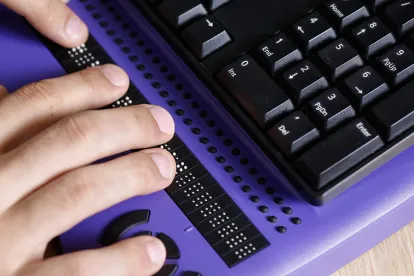Title III of the Americans with Disabilities Act of 1990 (“Title III”) prohibits discrimination on the basis of disability in public accommodations, requiring that individuals with a disability be offered the “full and equal enjoyment . . . of any place of public accommodation.” 42 U.S.C. § 12182(a). As we previously discussed, the 30-year-old statute does not directly address whether “places of public accommodation” include websites, mobile applications, and other emerging web-based applications and technologies and, therefore, does not provide a standard for ensuring accessibility for web-based accommodations.
Without explicit guidance on a standard to ensure accessibility under Title III, courts remain split on the extent to which Title III applies to virtual “places of public accommodation.” Because the statute does not squarely address businesses operating online, it has fallen to the Department of Justice (“DOJ”)—the agency in charge of ADA enforcement—and federal courts to attempt to fill the gaps in Title III. The main problem is that physical premises are heavily regulated and subject to very specific standards (in the ADA and in DOJ regulations), but the DOJ has failed to promulgate the same or similar standards for online accessibility.
Despite starting the rulemaking process in 2010, which contemplated establishing website accessibility requirements based on the World Wide Web Consortium’s (“WC3”) Web Content Accessibility Guidelines 2.0 Level AA Success Criteria (“WCAG 2.0 AA”), the DOJ terminated the process in 2017 and has not resumed it. Since then, federal courts have been deluged with thousands of Title III online accessibility cases per year, and the result has been a hodgepodge of decisions, many which are inconsistent with each other. Most courts have accepted that websites are places of public accommodation, but there remain inconsistencies regarding whether a business can be a “place of public accommodation” independent from a connection to a physical space, like a brick and mortar retail location.
This blog will summarize a few developments over the last few years and also forecast some potential developments for the remainder of 2021 and beyond.
The House Introduces Legislation, Which Dies During the Last Congress
In October 2020, Congressmen Ted Budd (R-NC) and Lou Correa (D-CA) introduced the Online Accessibility Act (H.R. 8478) (the “Act”), which aimed to bring uniformity to Title III online accessibility compliance guidelines and reduce the amount of Title III online accessibility lawsuits that are filed across the United States.
The Act would have adopted and codified the WCAG 2.0 AA accessibility standard for consumer facing websites and mobile applications. The drafters of the Act recognized that perfect compliance is not possible and that compliance can be extremely costly and difficult to achieve. Therefore, the Act provided that a website or mobile application should be considered accessible if it is in substantial compliance with WCAG 2.0 AA or any subsequent update, revision, or replacement to the WCAG 2.0 AA published by the WC3.
The Act also proposed a mandatory administrative process that claimants would have had to complete before filing suit. Claimants would initiate the process by providing notice to an owner or operator that their website or mobile application does not comply with the WCAG 2.0 guidelines. The owner or operator would then have 90 days to bring the website or application into compliance, and only if they then failed to achieve substantial compliance would the claimant be entitled to file an administrative complaint with the DOJ. The DOJ would then have 180 days to complete an investigation, at which point it could initiate a civil enforcement action against the owner or operator, and if the DOJ chose not pursue an enforcement action, the claimant could file suit.
The Act ultimately died in Committee and failed to pass during the Congressional session that ended on January 3, 2021, in large part because it failed to garner support from disability rights advocates and the plaintiffs’ bar. Moreover, advocates argued that the bill used an outdated standard of compliance (WCAG 2.0 Level A and Level AA) and not the more recent standard WCAG 2.1. However, it is very possible that someone will introduce another version of the Act or similar legislation in 2021.
Online Accessibility in the Courts
One of the cases we previously highlighted, Winn Dixie’s appeal to the Eleventh Circuit Court of Appeals of its bench trial loss in the Gil v. Winn Dixie case, is still pending a decision.
This case involved the first and only trial (a bench trial) involving an alleged inaccessible website under Title III in which the federal District Court adopted the WCAG guidelines as the accessibility standard. The Eleventh Circuit held oral argument on October 4, 2018, with Winn Dixie arguing that: (1) websites are not places of public accommodation under Title III; (2) the WCAG are not law and the trial court’s adoption of those guidelines violated due process; and, (3) Winn Dixie is in compliance with the ADA because Gil had not been deprived of the full benefit of and equal access to the services and goods in Winn Dixie’s stores. The Eleventh Circuit may hold that the WCAG guidelines should be the legal standard for accessible public accommodation websites in the absence of DOJ guidance. If the Eleventh Circuit does in fact agree with the lower court, businesses that fall within its jurisdiction (Georgia, Florida, and Alabama) will be able to plan and implement their accessibility measures with a level of confidence—that their websites and mobile applications will be subject to the same accessibility standard in the future—that is currently absent from Title III law. Additionally, it is likely that other courts in different parts of the country would follow suit.
The United States Supreme Court had an opportunity to step into the fray in October 2019 and resolve an appellate court circuit split. That petition for a writ of certiorari by Domino’s Pizza from a decision by the Ninth Circuit Court of Appeals in the Robles v. Domino’s Pizza, LLC case, asked the Supreme Court to decide: “Whether Title III of the ADA requires a website or mobile phone application that offers goods or services to the public to satisfy discrete accessibility requirements with respect to individuals with disabilities?” However, the Supreme Court declined to hear Domino’s petition.
Therefore, over the past two years, these types of cases have continued to proliferate, with plaintiffs’ counsel continuing to find new avenues and theories to pursue Title III liability against businesses—for example, for braille gift cards and hotel reservations websites.
WCAG 3.0
The WCAG is currently on version 2.1, featuring a tiered system of A, AA, and AAA compliance, with AAA being the highest and most stringent standard. While the WCAG are voluntary web content accessibility guidelines developed by the WC3—a non-governmental private consortium—without explicit guidance on a standard to ensure accessibility under Title III, the WCAG has emerged as a de facto standard, referenced by many courts, administrative agencies, and regulators, for online accessibility compliance.
On January 21, 2021, the W3C released the First Public Working Draft of WCAG 3.0, a new WCAG. WCAG 3.0 would be a significant departure from the WCAG 2.x series and would provide accessibility standards for more disabilities and a broader range of technologies, while also extending its reach to more technological components. The release of the First Public Working Draft of WCAG 3.0 is the first step in an iterative process to develop final guidelines, which W3C expects to be completed after 2022.
Given the significant role WCAG 2.x has played in the development of accessibility law and policy in the courts, administrative agencies, and with regulators, businesses should follow the development of WCAG 3.0 closely, as this version may eventually become the “gold standard” for compliance. As an initial step, interested parties can submit comments on the First Public Working Draft to the WCAG 3.0 working group by February 26, 2021.
Managing Litigation Risk for Title III Online Accessibility Claims
There are several steps that businesses can take while the Title III law continues to develop. While it is not always economically feasible for businesses, especially small businesses, to fully comply with WCAG 2.1, working toward “substantial compliance” with WCAG 2.1 is a good strategy for mitigating litigation risk. In general, this standard requires businesses to implement features that help facilitate easier navigation for disabled persons that are compatible with assistive technologies. There are also several online tools business can use to check whether their websites meet the WCAG 2.1 guidelines, which businesses may find helpful.
Here are some recommendations for businesses to use in working toward substantial compliance:
-
Conduct regular reviews and audits of websites and mobile applications and keep detailed records of compliance efforts.
-
If businesses maintain their websites internally, ensure that the responsible employee(s) receive regular training on Title III and website accessibility.
-
If businesses use a vendor, ensure that the vendor is up to date on the latest developments in online accessibility and that the vendor is implementing any necessary changes.
-
-
Ensure that websites and mobile applications contain an accessibility statement that discusses compliance measures and provides contact information for individuals who may have difficulty accessing the websites or applications.
-
Train relevant employees on Title III compliance.
-
If the website or application requires remediation:
-
Create a remediation plan to implement reasonable changes.
-
Notify users of the remediation and provide a phone number (a 24/7 number is the best practice) to assist users during the remediation.





 />i
/>i

